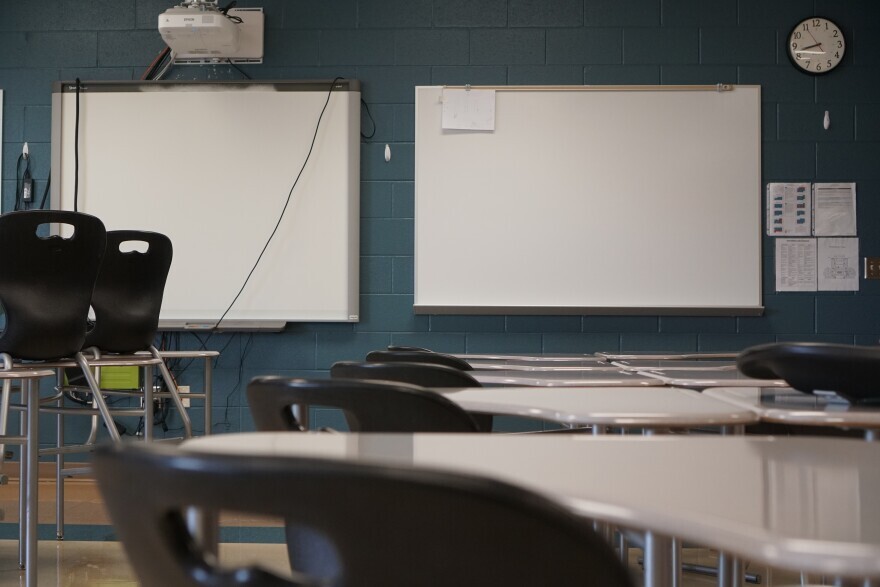Many parents have been confused about if masks are still required in their kid's schools. That's because the school mask mandate has recently been challenged in court. WNIJ's education reporter Peter Medlin spoke with Paul Bruno, University of Illinois assistant professor of education policy, organization, and leadership, to help explain the legal battle on school mask mandates.
Peter Medlin (PM): Honestly, my first question is pretty straightforward, which is, as of our speaking now, is there a school mask mandate in Illinois?
Paul Bruno (PB): I think there are two answers to that. I think one answer is it depends on who you ask. And the other answer is, for practical purposes, probably not.
PM: Right. So, it depends if you mean across the whole state is there one, or is there one at your particular school district?
PB: I think there are even mixed messages at the state level, from different branches of government giving different answers to that question about whether, for example, the governor still has authority to issue something like a mask mandate, given that the proposed rules were both rejected by some of the courts and by legislative oversight bodies, and they're different definitely at the local level. Different people give different answers primarily, I think, based on what they would like the answer to be.
PM: Right. But all of that adds up to say that, as of now, masks are optional at hundreds of different schools across the state and others have them required. Anyway, I wanted to kind of just rewind to the beginning of this month to try to give people a little bit of context as to how any of this happened. A Sangamon County judge right granted a temporary restraining order to a group suing to end the mask mandate. So, it was over 150 districts were named in the suit. And, you know, that doesn't mean that the districts themselves were joining the lawsuit. It's mostly parents, and maybe some teachers, from those districts, right?
PB: Yes, that's correct.
PM: They're suing on the grounds that the governor basically doesn't have the authority to mandate that students and staff wear masks in schools, along with requiring unvaccinated staff to get tested regularly, and close contacts of infected people to stay home. They're saying he doesn't have the right to do that?
PB: Yes, I believe that is right. And I believe that was based, in part, on rules about when and under what circumstances you can exclude students without various sorts of due process protections.
PM: In the lawsuit, the temporary restraining order is granted. And again, as we mentioned, this causes confusion because not every school district is named in the suit. So, [school district administrators] are wondering "Does this apply to us? Is the mandate suspended in our district too?"
PB: I think there are definitely school leaders who want local control, particularly when they disagree with the rule that has been imposed. I think there are also a lot of school leaders who have appreciated that the governor has been taking the heat by imposing a rule that they would like to impose but don't want to impose themselves.
PM: And the Illinois Attorney General appealed the [mask mandate] restraining order. And during the time we're waiting for the appeal decision, the Illinois Department of Public Health issues a new emergency rule requiring masks. They're like, we're gonna try to keep these rules as consistent as possible, at least until the appeal. But now, here comes another character: the state legislature. Their Joint Committee on Administrative Rules steps in, which is a group of both Republicans and Democrats, and strikes down the new IDPH rule. They say, the judge has already spoken and you're blocking due process by trying to pass new rules before the appeal. That ends the emergency rule. Now, the judge in the appeals case looks at that and says, the lawmakers voted pretty much unanimously to let these rules expire and so this is a "moot" point. The rules you're appealing to keep aren't even in effect anymore. This is dismissed. The governor says that he's taking the case to the Illinois Supreme Court. And, right now, individual schools can if they want to still have their own mask mandates?
PB: Correct. And the appellate — I believe it was the appellate — court that issued the decision was very clear about individual school districts still having leeway to take their own precautions, including mandates.
PM: Now's when you have people that might come to your school board meeting to yell at you about it.
PB: Realistically, they are coming to school today in a situation where there are either no rules, or it's not clear what the rules are. And so it's a little bit even worse than that, which is it's not even like there's going to be school board meetings that get very contentious soon — it wouldn't surprise me if you're already seeing schools and classrooms across the state getting a little more contentious.
PM: Is there anything else that people need to know to make this whole situation make a little bit more sense to them?
PB: One general piece of context is that, in a lot of ways, this debacle highlights a very common challenge in American education, which is just that it's so localized. That means it's very hard to coordinate in situations like this and, I think, that's part of what gives rise to all this confusion and causes all of this tension. Different districts are going to have different comfort levels with what kinds of rules they're willing to impose locally and, in many cases, they're going to have a lot of tension, I think, in particular between their staff and some of their families who might have diverging views about what kinds of rules they would like to see in place.


